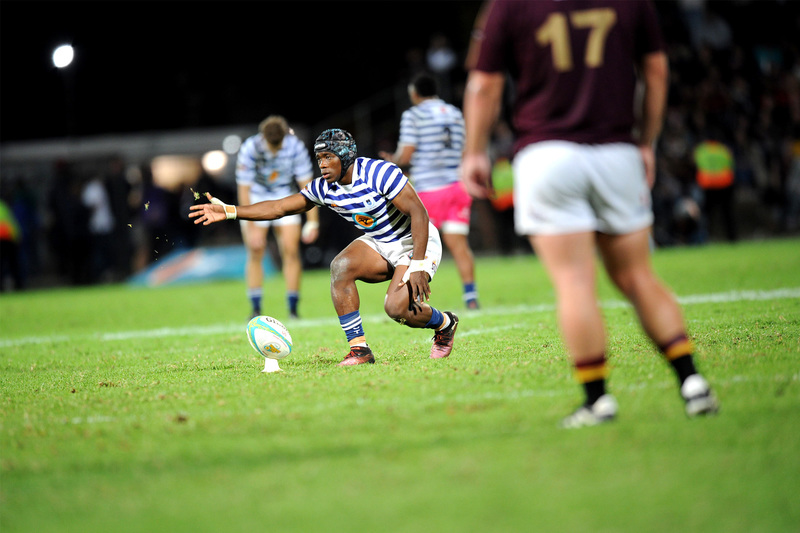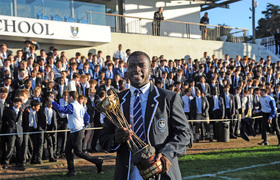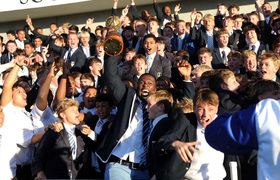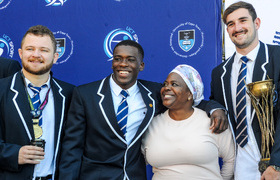UCT’s Ntokozo Makhaza earns dream Springbok call-up
06 June 2025 | Story Myolisi Gophe. Photo Lerato Maduna. Read time 5 min.
The astonishing meteoric rise of University of Cape Town (UCT) rugby star Ntokozo Makhaza took another positive turn this week when he received his first official call-up to the Springboks team – without having yet made his senior Currie Cup debut.
Makhaza, who is pursuing a degree in psychology and social development, was on Thursday named in Rassie Erasmus’ first Springbok squad of the 2025 season as one of the nine uncapped players. The 54-man squad is scheduled to kick-off the reigning back-to-back Rugby World Cup champions with a clash against the Barbarians at Cape Town Stadium on 28 June.
For the fleet-footed winger, who is set to join the Toyota Cheetahs next month, the news of his inclusion in the Boks team came as a complete surprise.
“To be honest, I found out through social media,” he said. “Someone tagged me and said congratulations, and at first, I wasn’t even sure what it was about. Then I saw a post on a rugby page and checked for myself – there was my name.”
“I didn’t come through the traditional ranks. I wasn’t a standout in a professional setup. But someone believed in me, and that means a lot.”
According to Makhaza, who played a key role in UCT’s Ikey Tigers team winning this year’s Varsity Cup, the moment was surreal, one that still feels like a dream. “I didn’t come through the traditional ranks. I wasn’t a standout in a professional setup. But someone believed in me, and that means a lot.”
Good impression
The Harrismith-born-and-bred Makhaza, who was named as the Varsity Cup Player of the Year for the second consecutive season, clearly left a good impression on the national coaches when he took part in the Springbok alignment camp last month.
Recalling his experience in the alignment camp, where he rubbed shoulders with the likes of Siya Kolisi, Damien Willemse, Bongi Mbonambi, Lukhanyo Am and others, he said: “It was surreal to be surrounded by people who are the best, the two-time world champions. I didn’t feel left out as they're very welcoming, friendly and always willing to help. It’s an amazing environment that I want to be part of.
“I tried to remain as calm as I could. But obviously inside I was filled with joy. I was in disbelief. I’m still in a bit of disbelief. But that disbelief isn’t necessarily me doubting my ability. To me, is this happening right now?’ Everything happening now is humbling. It just makes me so excited, and I don’t know how to react.”
Makhaza believes his call-up is a big deal, not just for him but for the broader university and the community at large.
“It reassures me that maybe, one day, I’ll officially wear the green-and-gold jersey in a match. Beyond just rugby, it inspires me that hard work eventually pays off in life. Its testament that if you keep going, keep working hard, you will be rewarded. I’m not saying I deserve it, it’s just a privilege to be part of this.
“To the rugby club as a whole and to people within the university environment, it gives them hope. People are watching and your dreams are valid and achievable. A lot of people have looked at my journey and thought, ‘This guy wasn’t ranked among the top. He didn’t come through a professional system.’ But someone believed in me, and now that belief is starting to pay off. It’s inspiring to other people as much as it is inspiring to me.”
Mark Bashe, the manager of UCT Sport and Recreation, congratulated Makhaza and called his selection a proud and historic moment.
“His selection to the Springbok squad is a testament to the structures we’ve built to support and develop student-athletes,” said Bashe. “He’s gone straight from Varsity Cup rugby to the national team, and that speaks volumes about his talent, determination, and the exceptional support from the Ikey Tigers coaching staff, sports science team, and the wider UCT community.
“When he was first invited to the Springbok alignment camp, we were hopeful. But we also knew it would be up to him to prove himself. And he did – he competed, he impressed, and he earned his spot. This is a win for him, for UCT, and for every young player who dares to dream.”
 This work is licensed under a Creative Commons Attribution-NoDerivatives 4.0 International License.
This work is licensed under a Creative Commons Attribution-NoDerivatives 4.0 International License.
Please view the republishing articles page for more information.










